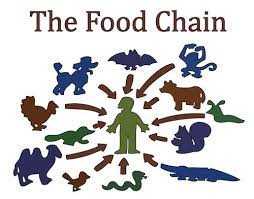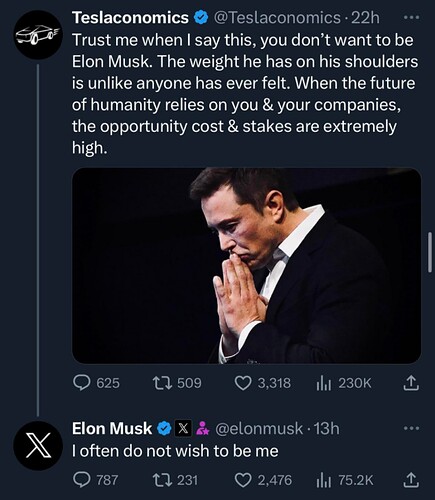Killing one thing to save another…
Fwiw. Better for humans also includes having lots of biodiversity, natural habitat, clean air, no mass extinction of species, continued existence of primates etc. So we don’t land at completely different points.
It also doesn’t exclude some ethical value on the suffering of animals, but also I mean, all morals are atoms screaming into the nihalistic void, so… you know.
Easily thousands. We already kill millions of pigs to improve the lives of people in the mood for bacon.
I just like the idea of what the world was like before humans started altering the environment. I want to see car-sized wombats again.
Yeah if you are not a vegetarian and you voted anything other than thousands you need to interrogate your values a little more closely.
You’ll need to define this.
Come take a look at my backyard.
Mine too. Gonna go at it hard with a chainsaw this fall…need a backup plan for what to do with bunny nests. It’s dense.
Heh. Almost posted this myself.
Sometimes I wish the environmental sociopaths would actually show some gumption about their evil carbon footprint. No half measures either bitches.
Funnily enough, this was exactly what people said about landing rocket boosters before it was demonstrated. Super obvious idea, dumb shallow sci-fi, but talk to the experts and they will explain all the reasons why it’s impossible. ULA went so far as to promote this silly alternative called SMART reuse (see what they did there) that involved the booster disassembling in flight and only the bit with the engines flying back to earth. It’s going great, obviously:
A concept for main engine reuse called Sensible Modular Autonomous Return Technology (SMART) was also shown during the initial April 2015 unveiling of Vulcan. In the concept, the booster engines, avionics, and thrust structure would be detached as a module from the propellant tanks after booster engine cutoff. The engine module would descend through the atmosphere protected by an inflatable heat shield. After parachute deployment, a helicopter would capture the module in mid-air. ULA estimated this technology could reduce the cost of the first stage propulsion by 90%, and 65% of the total first-stage cost.[35] By 2020 however, ULA had not announced firm plans to fund, build and test this engine-reuse concept, although in late 2019 they stated they were “still planning to eventually reuse Vulcan’s first-stage engines”.[36]
In April 2021 CEO Tory Bruno said that the additional launches purchased by Amazon for the Kuiper satellite constellation would require a higher launch cadence and that this provided support for the business case to go forward with the SMART concept.[81]
In July 2022, ULA pivoted and changed one of the high-level design objectives of the engine reuse recovery concept. Rather than recover the descending booster engines with a helicopter, ULA said they want to attempt recovery of the engines following atmospheric reentry, descent, and splashdown floating in the ocean on the inflatable aeroshell.
And now, of course, we have pivoted seamlessly from “Elon is dumb for thinking reusable rockets are possible” to “reusable rockets aren’t genuinely innovative because they were so obvious.” If Neuralink does something worthwhile, we will memory hole this entire conversation and you’ll say it’s just a cheap knockoff of The Terminal Man.
In a billion years of so, macroscopic life will go extinct due to climate changes driven by solar evolution. Advanced industrial civilization is the only hope for the biosphere. In some sense a billion years is unthinkably far away, but in another sense, multicellular life is already a third of the way through its natural lifespan.
Obv true, but I think that’s a bit of an unfair comparison. There are many thousands of species of insects and humans are only one species.

I used to follow a couple of those “no context humans” type accounts because they posted amusing pics and videos. All they do now is post Facebook clickbait shit like “BET YOU CAN’T NAME A STATE THAT DOESN’T HAVE AN “A” IN ITS NAME.”
I assume it’s because of the new monetization scheme - they are trying to increase views/engagement.
A lot of them also just post fake news/super hot takes now - to get people to tell them how wrong they are/retweet and mock them. You get paid the same for legit engagement as you do for rage engagement.
Making people mad is the best way to get engagement, it’s why the end game of for-profit social media is AI bots making shitty trolling posts to upset you.
A lot of them also just post fake news/super hot takes now - to get people to tell them how wrong they are/retweet and mock them. You get paid the same for legit engagement as you do for rage engagement.
I see a lot of that on Facebook. I’ll be scrolling (for what reason, I don’t know) and see a “suggested” post from some sports account that ranks players or teams or something. The top of the rankings are often ridiculous like - and I’m just making this up - putting the Packers at #2 after Week 1. I almost commented on one once and then realized:

And now, of course, we have pivoted seamlessly from “Elon is dumb for thinking reusable rockets are possible” to “reusable rockets aren’t genuinely innovative because they were so obvious.
Ask Elon.
Musk has taken exception to Blue Origin and Bezos filing for patents around reusable rocket technology as well. “His patent is completely ridiculous,” Musk said. “People have proposed landing on a floating platform in the ocean for a half century. There’s no chance whatsoever of the patent being upheld because there’s five decades of prior art of people who proposed that six ways to Sunday in fiction and nonfiction. It’s like Dr. Seuss, green eggs and fucking ham. That’s how many ways it’s been proposed."
Of course, he adds
"The issue is doing it and like actually creating a rocket that can make that happen.”
Which is true. But SpaceX was not first to make reusable rockets. They did build a commercial reusable rocket and they get due credit and a fat financial reward for that.
Quotes are from Vance’s book.

